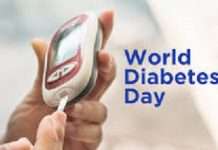Few weeks ago, the federal government alerted Nigerians on the spread of the deadly Ebola virus disease (EVD) to some neighbouring West African countries, which puts the nation at risk. Health minister, Professor Onyebuchi Chukwu, while speaking with newsmen, at the end of a Federal Executive Council meeting in Abuja, said that the virus had been spreading eastward towards Nigeria, adding that the nation was already facing real danger of the virus from Central African Republic.
Professor Chukwu, however, noted that Nigeria had not recorded any case of the disease, which he said had spread across West Africa, with 137 cases and 86 deaths recorded since the beginning of the year. The minister warned that there was no vaccine for medical prevention of the disease and asked Nigerians to take necessary precautions, which include constant washing of the hands after each activity, washing fruits before eating, and consulting a physician regarding any feverish feeling.
It must be reiterated that Ebola is a highly infectious disease that can be spread through contact with blood, organs or fluids of infected animals or persons. The virus, which was first traced to wild bats, chimpanzees, monkeys and gorillas in some African countries, and has since spread to humans, is better diagnosed in a laboratory because the disease has symptoms similar to malaria, typhoid fever, cholera, meningitis, relapsing fever, as well as other viral haemorrhagic fevers.
Ebola, it must be stressed, is perhaps the most dangerous health challenge to have ever faced the human race. According to the World Health Organisation (WHO), this condition, formerly known as Ebola haemorrhagic fever, is a severe, often fatal illness with a fatality rate of up to 90 per cent. The disease first appeared in 1976 in two simultaneous outbreaks, in Nzara, Sudan, and in Yambuku, Democratic Republic of Congo. The latter was in a village situated near the Ebola River, from which the disease takes its name.
WHO has noted that this acute viral illness, often characterised by the sudden onset of fever, intense weakness, muscle pain, headache and sore throat, and followed by vomiting, diarrhoea, rashes, impaired kidney and liver function, and in some cases, both internal and external bleeding, has an incubation period of between two to twenty-one days. It usually leads to death of infected patients.
While we agree with the health minister’s submissions on this deadly virus and the need for Nigerians to take precautionary measures against its outbreak, we however call for specific, urgent actions to achieve this objective. The FG must be mindful that, while several vaccines are being tested and new drug therapies are being evaluated, in a bid to combat the disease, there is yet to be any positive news on the two fronts. Thus, the cliché, prevention is better than cure has become more apposite than ever. After all, fatality is almost the only guaranteed alternative.
The health minister has to speedily deliver on his promise to start an enlightenment campaign in the mass media to educate Nigerians on preventive measures against the disease. Nigerians must know that improved personal hygiene and consumption of hygienic food and fruits can help significantly to prevent the deadly virus.
There is also need for proper surveillance of people coming into the country from other countries where the fatal infection has been reported. Our security agencies, especially at the ports (sea and air) of entry, must also be educated on how they can help in this regard.
The medical community must equally be adequately prepared to contain this virus, should there be any reported case in the country. All that the country’s health personnel need, in terms of protective equipment to prevent the spread of the disease should, as a matter of urgency, be provided for our health institutions.
Above all, it must be stated that, as a nation, we must begin to work towards moving our health sector from its present infantile, dependent level to that of maturity and proactivity in disease prevention and control. Except this is done, we may sooner or later find ourselves battling with catastrophic consequences, should there be an epidemic like the Ebola virus disease.
Ebola outbreak in Nigeria can be prevented, and all necessary steps must be taken to ensure that the country is protected and fortified.












